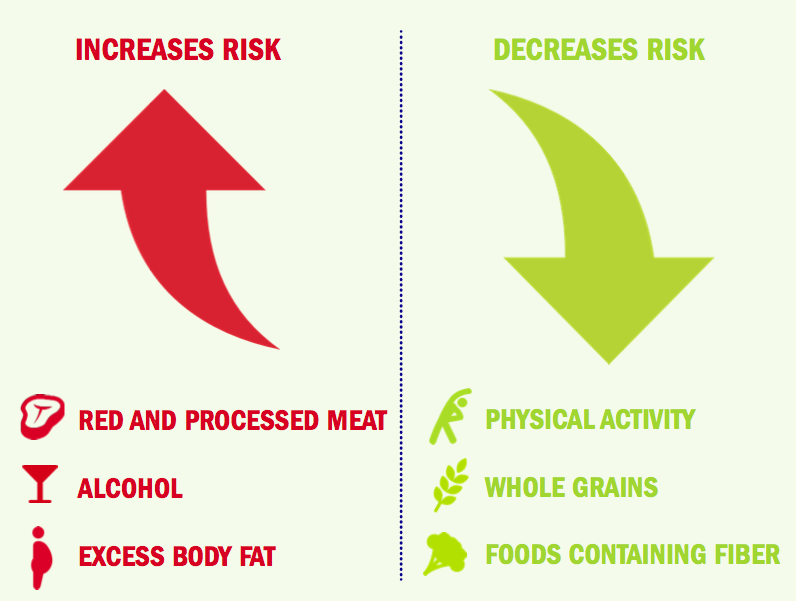AICR’s latest report suggests that lifestyle factors, especially dietary habits and physical activity, play a major role in causing or preventing colorectal cancer. Whole grains and exercise were found to reduce the risk whereas processed meat and having obesity increased the risk of this cancer.
Our news release highlights the key findings. But the report was a comprehensive one — including 99 studies with 29 million people –and there’s a lot in there. Here, we answer a few of the most common questions.
What is the link between colorectal cancer and whole grains?
We found for the first time that eating whole grains reduces your risk of colorectal cancer. Risk decreases by 17% per 90 grams of whole grains consumed – the equivalent of three servings, such as two slices of wholewheat bread and 1/2 cup of brown rice. This adds to the evidence that eating foods containing fiber decreases the risk of colorectal cancer.
How much exercise would you have to do to reduce colorectal cancer risk?
Our research also reconfirms that physical activity reduces your risk of colon cancer. People should aim to do at least 30 minutes of moderate level physical activity a day.
Does walking count?
Walking is a great way to burn calories to help maintain a healthy weight and if you walk briskly or up hills, this activity will help reduce your risk of colon cancer.
How does processed meat increase your risk?
Our report reconfirmed that eating processed meat such as bacon and ham does increase the risk of colorectal cancer. There is a 16% increase in risk for every 50 grams of processed meat consumed a day, that’s about the amount in a hot dog. One possible way processed meat may increase risk involves a compound called heme, which contains iron and gives red meat its color. Heme has been shown to damage the lining of the colon.
Another theory is that some processed meat is cooked at high temperatures which lead to the formation of heterocyclic amines (HCAs) and polycyclic aromatic hydrocarbons (PAHs). HCAs and PAHs have been found to be mutagenic—that is, they cause changes in DNA that may increase the risk of cancer.
Processed meat is also a source of N-nitroso compounds, which can lead to cancer formation.
The report found red meat increase the risk. Why would it?
Researchers are still investigating how red meat causes cancer. As with processed meat, it contains the heme compound which gives red meat its color. As with heme in processed meat, it has been shown to damage the lining of the colon.
We also know that when we eat red meat, chemical compounds called nitrosamines are formed, which are known to damage the DNA in our cells, which can cause cancer.
Does drinking alcohol increase your risk?
Yes we found that drinking two or more alcoholic drinks a day increases your risk of bowel cancer.
So it’s ok if people drink just two glasses of wine a day?
Though for colorectal cancer our evidence showed an increased risk at two daily drinks, when it comes to other cancers such as breast or esophageal any amount of alcohol increases the risk. Therefore we would recommend that to reduce cancer risk as much as possible, it is best to not drink alcohol at all.
Why does being overweight or obese increase the risk of cancer?
There are a few theories on this but we are doing more research to confirm these. For example, body fatness influences the levels of a number of hormones and growth factors that can promote the growth of cancer cells. In addition, overweight and obese people often have increased levels of insulin in their blood, which over a period of time can affect the levels of growth factors, encouraging uncontrolled cell division and promoting the development of cancer.
Body fatness also puts the body in a state of inflammation, which can promote cancer development.
Can you ever be sure that alcohol/obesity/bacon gave someone their cancer?
Cancer is very complex; therefore it is difficult to determine exactly what was responsible for an individual’s cancer. It is however possible to look at someone’s lifestyle and identify potential factors that may increase their risk of getting cancer, such as drinking too much alcohol or being overweight.
What is the most important thing that people can do to reduce their cancer risk?
After not smoking, the most important thing you can do to reduce your cancer risk is maintaining a healthy weight.
What diet do you recommend for cancer prevention?
In general for cancer prevention we recommend that people eat a healthy diet high in wholegrains, vegetables and fruit, maintain a healthy weight and do at least 30 minutes of physical activity a day.
Take a look at our 10 Recommendations for Cancer Prevention, which include eating whole grains, limiting your intake of red and processed meat and maintaining a healthy weight.







Do have any PowerPoint presentations available for RDs to use for presentations regarding ‘how food can prevent cancer’
I am doing a presentation in August and am curious to know if anything is available.
Hi Susan,
We don’t have any ready to use presentations, but you are welcome to use the information from our Foods that Fight Cancer and reference our Cancer Prevention Recommendations. You can also find great information on the Oncology DPG website: https://www.oncologynutrition.org/